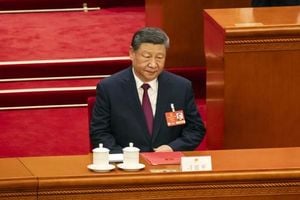The courtroom drama film Je le jure, directed by Samuel Theis, hit theaters in France on March 26, 2025, but its release is clouded by serious allegations against its director. The film, which had originally been anticipated as a strong entry in this genre, now faces the potential of becoming an underperformer at the box office due to the accusations of rape leveled against Theis by a crew member during production.
The storyline follows Fabio, a construction worker in his forties, who finds himself serving as a juror in the trial of a young arsonist accused of causing a firefighter’s death. As he navigates his own life’s challenges—including a secret romantic relationship with a woman significantly older than him—he must confront the realities of the justice system and personal responsibility.
During the filming in June 2023, Theis was accused of sexual assault, leading to an internal crisis within the production. Caroline Bonmarchand, the film's producer, outlined the situation in a report to the media, stating, "It is necessary to contextualize the film due to a report of violence against its director." This statement not only reflects the complexity surrounding the film’s release but also highlights the nuanced discussions about accountability in the entertainment industry.
To navigate this challenging period, Bonmarchand facilitated a series of crisis meetings wherein a protocol was established. This protocol allowed Theis to direct the film from a separate room, ensuring that the film could be completed while addressing the serious allegations responsibly. "In such cases, the responsibility of the film's success or failure should not fall on the complainant," Bonmarchand emphasized, balancing the need for transparency with the crew's right to a safe working environment.
The film's distributor, Alexandra Henochsberg, expressed concerns that the controversies would hinder its ability to find an audience. Initially, she anticipated that the film would be shown in about 200 theaters, but now estimates show it will only be distributed in 60 to 70 theaters, with a maximum of 100. "In normal circumstances, a film like this would release on around 200 copies," she remarked, indicating the sharp decline in anticipated box office reach.
In an effort to maintain integrity and public trust, the film's team also implemented a unique approach to its promotional strategies. Instead of featuring Theis in promotional activities—something that is customary for directors—the cast took on the responsibility of promoting the film. Efforts were made to create a contextualization message that would precede each screening, noting that the film had benefitted from special measures due to the serious nature of the allegations against its director.
This approach reflects a broader change in the industry as filmmakers grapple with the implications of #MeToo, re-evaluating how films that are marred by controversies should be handled. As noted in discussions surrounding Je le jure, there is a growing consensus on the need for policies that prioritize victim support while also allowing for the survival of creative works. "A film is a collective story, and we’re convinced that the result of this work shouldn’t be invisibilized due to the actions of one individual," explained Bonmarchand.
As the film continues to navigate the complexities of its release under these dire circumstances, it highlights the pivotal role that industry practices must play in protecting both the integrity of the film and the wellbeing of individuals involved in its production. Advocates demand a shift towards frameworks that encourage victims to speak out without fear, ensuring that future productions can balance the creative process with ethical considerations.
The challenges associated with Je le jure are emblematic of larger shifts within the industry as it seeks to reconcile artistic expression with ethical accountability. As it grapples with difficult conversations about the past, the film might just pave the way for a more thoughtful and transparent future in cinema.








